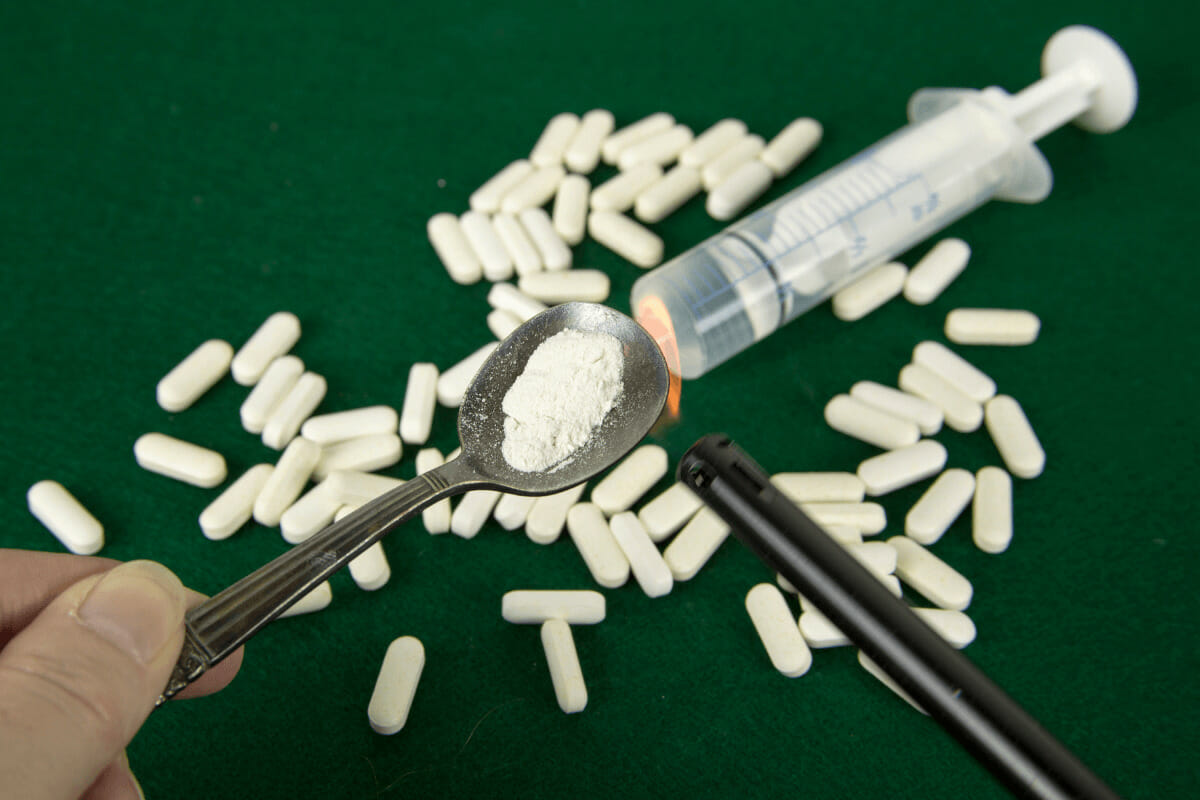
Opioids are a factor in approximately 70% of all overdose deaths in the U.S., and most of those deaths can be blamed on fentanyl. [1] All opioids are highly addictive and dangerous when misused, but fentanyl is 50 times stronger than heroin and 100 times stronger than morphine. Unfortunately, fentanyl addiction is an increasingly prevalent concern today for people across the world.
For perspective, think of heroin as a glass of wine and fentanyl as a glass of pure ethanol. Fentanyl addiction is dangerous because even small doses can be deadly. The CDC estimates that over 150 people die daily from a fentanyl overdose. [2]
What Is Fentanyl?
Fentanyl is a synthetically produced narcotic opioid. Pharmaceutical companies developed fentanyl to help people with severe pain, such as cancer patients. It is an opioid agonist, which means it binds to the brain’s opioid receptors.
Opioid receptors control pain, but after being exposed to several doses of opioids, the brain stops its production of pain-relieving and pleasure-inducing hormones. At this point, a person’s body becomes dependent on fentanyl or other opioids to produce any feelings of pleasure.
Because fentanyl is extremely potent, it is highly addictive. Once addicted, attempts to stop using can cause severe withdrawal symptoms. Fentanyl is available by prescription but is also produced and sold illicitly.
Prescription fentanyl is administered as lozenges, patches, and shots. Illegal fentanyl typically comes in powder form or is made into pills that look like prescription medication.
Signs of Fentanyl Addiction
The Diagnostic and Statistical Manual of Mental Disorders 5th edition considers individuals to have a substance use disorder if they display two or more symptoms of addiction in 12 months. The symptoms of fentanyl addiction include:
- Euphoria
- Drowsiness
- Lethargy
- Itching or hives
- Dizziness, lightheadedness
- Severe constipation
- Sweating
- Shaking
- Swollen extremities
- Difficulty sleeping
- Loss of appetite, weight loss
- Depression
- Hallucinations
- Headache
- Vision problems
Fentanyl addiction is also marked by the deterioration of social and family relationships and criminal or unethical acts, such as theft. Patients who are abusing prescription fentanyl often go “doctor shopping” as they try to find new physicians who will prescribe the medication. Addiction, including opioid addiction, affects people from all backgrounds and ages.
How the Danger Increases
Fentanyl itself poses many health concerns. But it becomes even more dangerous when mixed with other substances. People who are already struggling with addiction to heroin or other opioids may unknowingly ingest drugs that also contain fentanyl.
Drug dealers may also mix illicitly manufactured fentanyl (IMF) with cocaine, methamphetamine, and heroin. They make it into tablets that look like prescription medications. Ingesting fentanyl-laced drugs can cause a fatal overdose.
Symptoms of a fentanyl overdose include:
- Constricted or “pinpoint” pupils
- Weak or slowed breathing
- Limp body
- Cold/clammy skin
- Discolored lips and fingernails
- Loss of consciousness
- Gurgling or choking sounds
If you suspect someone has overdosed on fentanyl, call 911 immediately. If it is available, administer naloxone. Try to keep the person up and awake. If they must lay down, place them on their side and stay with them until help arrives.
Can You Treat Fentanyl Addiction?
Fentanyl addiction has become the number-one cause of drug overdose in the U.S., but that doesn’t mean the situation is hopeless. Treatment for fentanyl addiction is available and effective.
Addicted people should not try to overcome the problem alone. First, medical supervision is crucial to stay safe during withdrawal. And second, recovery from any form of addiction is more successful when patients participate in therapies specifically designed to address addiction issues.
Support from recovery specialists and peers is integral to maintaining long-term sobriety, regardless of the substance or activity to which a person has an addiction.
Find Treatment for Fentanyl Addiction at Silver Sands Recovery
At Silver Sands Recovery, we understand the fears and frustrations associated with fentanyl addiction, and we are here to support our patients every step of the way. Silver Sands Recovery takes a family-style approach to addiction treatment because addiction affects the family as a whole, not just one person. Because of the dangers associated with fentanyl, we urge patients to get help as soon as possible. For more information about our fentanyl addiction treatment program, contact Silver Sands Recovery today.
Sources:
[1] https://www.cdc.gov/drugoverdose/epidemic/index.html
[2] https://www.cdc.gov/nchs/nvss/vsrr/drug-overdose-data.htm
About the author:

Lisa Waknin is the Founder and Director of Silver Sands Recovery, located in Prescott, Arizona. Lisa started Silver Sands Recovery after immersing herself in the addiction treatment world for several years to figure out what could be done differently to help her daughter and others like her to overcome addiction and stay sober. She believes in a hands-on treatment approach, which includes taking someone out of their environment, providing a 90-day program in a structured environment. During treatment, clients not only recover physically but also learn to live their life again. Lisa is a sought-after expert speaker for recovery support groups, charities, schools, communities, and companies wanting to educate themselves on the explosion of opiate and heroin abuse in our country and the best way to understand, treat, and beat it.




